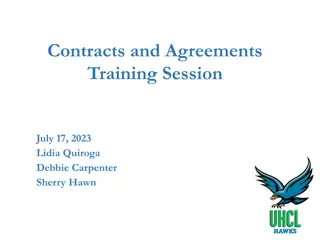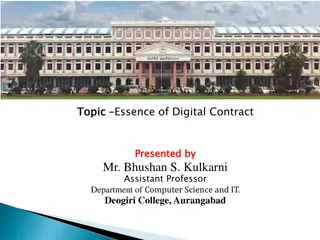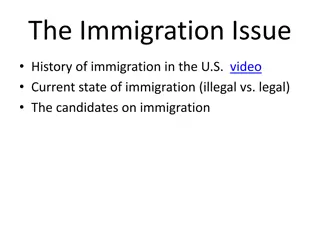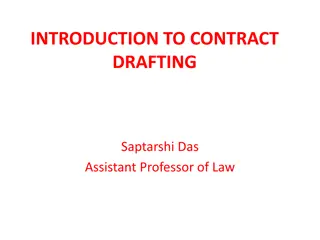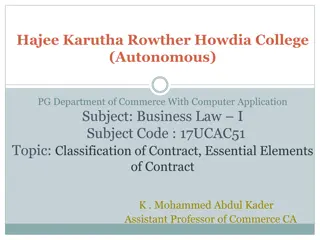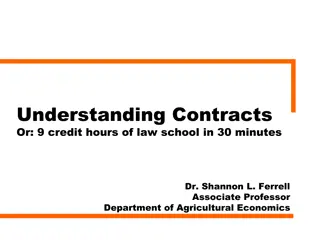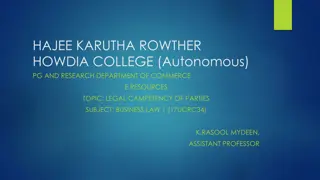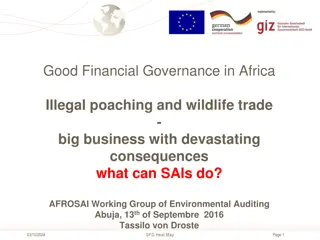Understanding Illegal Contracts in Common Law
Courts uphold agreements between parties but do not enforce contracts that violate statutes or public policy. Contracts against public policy include those prejudicial to justice, corrupting public office, deceiving authorities, committing crimes, promoting immorality, restricting marriage, ousting court jurisdiction, maintenance contracts, and those going against international relations. Illegal contracts are void and unenforceable, with recovery options varying depending on the parties involved. Prohibition by statute and contracts undermining public policy are key factors in determining the legality of a contract.
Download Presentation

Please find below an Image/Link to download the presentation.
The content on the website is provided AS IS for your information and personal use only. It may not be sold, licensed, or shared on other websites without obtaining consent from the author. Download presentation by click this link. If you encounter any issues during the download, it is possible that the publisher has removed the file from their server.
E N D
Presentation Transcript
OUTLINE ILLEGALITY & Void Contracts Prohibition by Statute Public Policy Contracts against public policy unenforceable at Common Law 1. Contracts prejudicial to the administration of Justice 2. Contracts leading to Corruption of Public Office 3. Contracts to deceive Public Authorities 4. Contracts to commit crime, tort of fraud 5. Contracts to promote Sexual Immorality 6. Contracts affecting Freedom of Marriage 7. Contracts to oust the Jurisdiction of the Courts 8. Maintenance Agreements 9. Contracts prejudicial to good International Relations 10. Contracts in Restraint of Trade Effects & Consequences of Illegal Contracts Recovery of Money had in Illegal Contracts Recovery by the Innocent Party Recovery by the Guilty Party Severance Enforcement of the Contract Executory Contracts
VOID AND ILLEGAL CONTRACTS It is the policy of the courts to respect agreements concluded between contracting parties and not to unnecessarily interfere with their transactions. The rationale lies at the heart of the common law concept of freedom of contract. Conversely, the courts consider it their prime duty to ensure that the public is protected from any form of harm or abuse. It is for this reason that the courts tend to resist the enforcement of contracts that tend to injure the moral fabric and sensibilities of society. Consequently, the courts may declare a contract void under two main circumstances: Where the contract contravenes a statute. Where the contract is contrary to public policy. a. b.
a. Sometimes, Parliament may pass a law prohibiting certain contracts. Such contracts cannot be enforced, if entered into by contracting parties. For example, an agreement by drug dealers to trade in drugs is an illegal contract. Another example is the Price Control Decree, 1974 (NRCD 305) as amended, which prohibited any sale above the control price. The National Lotto Act, 2006 (Act 722) prohibited any form of lottory or gambling (including Banker to Banker ), except with the Ghana National Lottory. Lending money without the requisite licence sinned against the Money Lending Ordinance, Cap 176. Again, the Exchange Control Act 1961 (Act 71), prohibited the conversion of Ghanaian currency into dollars through an unauthorized dealer, otherwise called the "black market". Even converting Ghanaian currency abroad was deemed illegal, as it contravened the Customs and Excise Decree, 1972 (NRCD 114). The courts will therefore not enforce any such contract, because enforcing them would be a contravention of statute or encouraging people to disobey the law. Contracts prohibited by Statute In Olatiboye v. Captan [1968] GLR 146, an argument was canvassed that a transaction was illegal because it violated the provisions of the Diamond Mining Industry Protection Ordinance, Cap 152 (Rev.) s. 3(1) in that the respondent had no license as required by that statute.
b. Contracts which undermines Public Policy A contract is contrary to Public Policy if it offends public interest, such that, it will promote immorality, disorderly conduct or a breach of the peace. These contracts may not necessarily be prohibited by statutes, but the common law follows the rule expressed in Latin as "ut res magis valeat guam pereat" (i.e. it is better to preserve than to destroy). By this principle, the common law tries not to enforce any contract that has the tendency of splitting society into pieces or injuring the environment or public health and safety. In Simmonds v. Trasacco Estates [2010-2012] 1 GLR 293 at 303, Honeyenuga JA held: The principle of public policy demands that nobody would be allowed to take advantage of his own wrong. Public policy may however vary from society to society. It may also change over time. In the ensuing slides, we will look at various contracts found by the common law to be contrary to public policy.
1. Contracts Prejudicial to the Administration of Justice It has been held that any contract which is entered into to pervert the course of Justice should not be enforced. An example is paying money to a prosecutor to drop a case. Authority: Keir v Leeman (1846) Facts: The plaintiff intended to prosecute the defendants for assault and rioting, but agreed to drop the charges if they bribed him by paying off a debt owed to him. The defendants were subsequently acquitted because the plaintiff ensured that no evidence was given against them. However, when the money was not being paid, the plaintiff sued. Held: The plaintiff s action failed, because the contract was based on an illegal consideration which is an agreement to stifle prosecution.
2. Any contract which is intended to lead to inefficiency in public office or a contract for one to use his official position to secure a private reward is unenforceable. Contracts leading to inefficiency and Corruption of Public Office Authority 1: Parkinson vs. College of Ambulance Ltd and Harrison (1952) Facts: The defendant's secretary told the plaintiff that if Colonel Parkinson (i.e. the plaintiff) could give a very big donation to charity, he would ensure that Parkinson is conferred with the title and status of Knighthood (This was of course untrue) Parkinson donated 3000 but sued the charity and the secretary to recover his 3000 when the Knighthood was not forthcoming. Held: Parkinson action failed. It was decided by the Court that a contract for the purchase of a title is against public policy and therefore illegal. Parkinson knew that it was illegal and could therefore not sue to recover his money or claim any damages.
Authority 2: Facts: outstanding indebtedness of 520 to him; if the defendant could use his influence to enstool the nephew of the plaintiff, Kwame Sei as the Agogohene. The defendant was an influential royal of the throne and succeeded in framing destoolment charges against the reigning chief, Kwaku Dua before the Owusu Afriyie Committee of Enquiry. The defendant then put his weight behind the candidature of the plaintiff s nephew who never got enstooled despite his election by the stool elders. Apparently, the queenmother who was not there had opposed Kwame Sei and so she nominated another person who was eventually enstooled. The plaintiff consequently sued the defendant for the recovery of the money owed to him. Kwarteng v Donkor (1962) The parties agreed that the plaintiff would forgo the defendant's Held: His action failed. The Court decided that an agreement to improperly influence a person to secure a position for financial consideration is injurious to the public interest and therefore illegal.
3. Contracts to Deceive Public Authorities Any contract which is intended to deceive a public institution like deceiving the Internal Revenue in evading tax is unenforceable. Authority: Alexander v. Rayson (1936) Facts: The plaintiff let a flat to the defendant for 1,200 a year. They prepared two separate agreements for the same tenancy; one was 450 and the other was 750. The plaintiff produced the former for the purpose of his tax assessment in order to pay a lesser tax. When the defendant failed to pay, the plaintiff sued to recover the entire sum. Held: The Court of Appeal decided that since the document was intended to deceive the local authority, Alexander was not entitled to a remedy from the court and his action failed.
4. Contracts to Commit a Crime, Tort or Fraud on A 3rd Party The courts do not enforce any contracts that seeks to accomplish a crime like murder or stealing, or a tort like defamation or even a fraud on a 3rdparty. Authority on Crime: Everet v Williams (1725) Facts: Two (2) highway men agreed to rob a coach and share the proceeds equally. When one refused to share the proceeds, the other sued him. Held: His action failed. The Court refused to enforce the contract, as it was based on criminality. His counsel who signed the pleadings was made to pay the costs. The other solicitors were also fined 50, while the 2 men were hanged. Authority on Tort: Apthorp v Neville & Co. (1907) Facts: The plaintiff lost in an action for breach of promise to marriage and wrote an account of the action which was libelous. He contracted with the defendant to publish a limited number of copies. The plaintiff paid 50 on account, but the defendant refused to go ahead with the contract when they discovered that the manuscript was defamatory. The plaintiff sued. Held: The Court decided that the contract was illegal and therefore unenforceable because it was a contract to publish a libel. The plaintiff therefore failed in his action.
5. Contracts to promote sexual immorality A contract is not enforceable if it seeks to promote sexual promiscuity. Such contracts tend to undermine good morals. Any contract which directly or indirectly encourages prostitution is unenforceable as being contrary to public policy. Authority: Pearce v Brooks (1866) Facts: The plaintiff contracted to supply the defendant (whom they knew to be a prostitute) with a new brougham. She intended to use the brougham to solicit clients for sex. The prostitute failed to pay and the plaintiffs sued for payment. Held: The contract was unenforceable because it contributed to immorality. It follows that by the application of the principle, a prostitute cannot sue her client in court for the recovery of her fees if the client does not pay. However, in Lloyd v. Johnson (1798), it was held that it was not illegal to contract to wash a prostitute s linen which included a quantity of gentlemen s nightcap. Also in Appleton v. Campbell [1826] it was held that contracts to lease premises to prostitutes for their profession are illegal, but a contract to let a room to a prostitute who practices her profession at another place is valid, because persons of that description must have a place to lay their heads.
6. Contracts affecting the freedom of Marriage A contract which imposes a restriction on marriage or is intended to arrange a marriage for reward is unenforceable. Another striking fact under this point is the unenforceability of contracts tending to interfere with the sanctity of marriage like a promise by a married man to marry another woman immediately his wife dies. Even under common law, engagements (In Ghanaian context, mere promises) to marry are not enforceable. Authority: Lowe v Peers (768) Facts: The defendant executed a deed which stated as follows; ''1 do hereby promise Mrs. Catherine Lowe, that I will not marry with any person besides herself. If I do, I agree to pay the said Mrs. Catherine Lowe 1,000 within three months next after I shall marry any body else." 10 years later he married another woman and Mrs. Lowe sued (she was then a widow and had stayed single since before the defendant met her). Held: Her action failed. The Court decided that the contract was in restraint of marriage and as such was void. But a contract which deters a person from marrying by providing some inducement which will end when he or she marries is not void. For example in Gibson v. Dickie [1815], it was held that a promise to let a house to a person until marriage was valid.
7 Contracts to oust the Jurisdiction of the Courts These are contractual clauses which seek to exclude the power of the court to decide question of law and deprive the parties of the right to enforce causes of actions in the Court. Anctil v. Manufacturers Life Insurance [1899] A clause in an insurance policy provided that the policy could not be contested in court in certain events. The plaintiff attempted to sue on it and it was held that the clause did not stop the court from deciding it if he had an insurable interest. It is perfectly legal to have a clause in an agreement to refer to a private tribunal or an arbitration for a decision before going to court. But if such a clause deprives the parties to their rights to go to court, it is contrary to public policy and void. This means the parties to a contract are at liberty to make it a condition-precedent of going to court that arbitration should have taken place. Scott v. Avery [1856] An insurance policy contained a clause providing that the assured should not be entitled to maintain any action on his policy until the matters in dispute shall have been refereed to and decided by the arbitrators and the obtaining of the decision of such arbitrators is hereby declared to be a condition-precedent to the right of (the assured) to maintain any action. The clause was declared valid- it did not oust the jurisdiction of the court, but only laid a timetable for when that jurisdiction arose. In Re GPRTU; Tetteh v. Essilfie [2001-2002] The Supreme Court held that the courts would ordinarily respect the wishes of parties to an agreement to submit their disputes to an arbitration. But they still have the power to inquire into the validity of such exclusionary clauses to determine whether they relate to the ordinary conditions of the contract only or can be classified as being against public policy and make the enforcement of such a clause unenforceable.
8. Maintenance Agreements Agreements which prevent wives from seeking maintenance in Court are also unenforceable. Hyman v. Hyman [1929] The House of Lords held that a wife could not validly contract with her husband not to apply for maintenance on a divorce, and that a contract of that kind did not prevent her from applying to the court.
9. Contracts prejudicial to good international relations Where a contract has as its object the doing of an act illegal by the law of a foreign country, it is illegal or void. Any contract which can undermine the national security of another country or affect its foreign policy is unenforceable. (1) Authority: Regazzoni v. Sethia (1944) Facts: The government of India displayed its open condemnation of the South Africa s policy of Apartheid and banned the export of goods to South Africa. The Respondent agreed to sell to the appellant jute bags. The two parties then agreed that they shipped them from India to Genoa for resale in South Africa, thus avoiding the ban. The appellant sued for damages for non-delivery of the bags in England. England law governed the contract. Held: The court held that it could not help the plaintiff to enforce the contract as it was an attempt to contravene India Law. (2) Authority: Facts: into the U.S at a time when the import of alcohol into that country was prohibited. Held: The contract was held to be illegal and void, because the object to be attained was a "breach of International Comity" Forster v. Driscoll (1929) A contract was made to ship whisky across the Atlantic so that it could be smuggled
10. A Contract in Restraint of Trade These are clauses in a contract which purport to limit a person's liberty in the future to carry on his trade/occupation, profession or employment in a manner as he chooses. In Petrofina (Great Britain) Ltd. v. Martin [1966] Ch 146, Diplock LJ defined: A contract in restraint of trade is one in which a party (the covenantor) agrees with any other party (the covenantee) to restrict his liberty in the future to carry on trade with other persons not parties to the contract in such manner as he chooses. Examples include an employer who contracts with an employee not to work with his competitor after leaving his employment or a vendor who contracts with a purchaser not to deal with or sell goods of his competitor. Such contracts are deemed to be contrary to public policy, because they impose a restriction on one's right to carry out his business or trade the way and manner he wants. Biggs v. Oates [1991] The parties were solicitors and in a contract of employment with the law firm, there was a clause that the employee would not set up a practice of his own, nor go to a rival law firm, within a five miles radius of his employers, the restriction was to last for five years. The court found that the restrictions were reasonable and binding.
However, the Courts may enforce such contracts in restraint of trade, if the applicant shows that he has a legitimate interest to protect and the restriction is not wider than necessary. A business goodwill, trade secret and clients' protection have all been held to be legitimate interest which an employer or vender may seek to protect. That aside, the restraint must not be unreasonable in the sense that, it should not be extensive in area and duration than the employers or vendors' interest require. Where an employer gets his clients from a distance of 5 kilometers radius, a restraint covering 20 kilometers radius may be unreasonable, as it extended further than was legitimately warranted. In Mason v. Provident Clothing [1913] a covenant by a canvasser, employed to sell clothes in Islington, not to enter into a similar business within 25 miles of London was held void. The area was too large. In Spencer v. Marchington [1988], a restrictive covenant to prevent a former employee being engaged within a radius of 25 miles of the ex-employer s business was too wide and contrary to public policy. On the other hand, a worldwide restraint is possible. In Nordenfelt v. Maxim Nordenfelt Guns & Ammunition [1894], a worldwide restraint was held valid. The plaintiff entered into a contract for the sale of his worldwide business. He undertook not to compete with it (inter alia) in the trade or business of guns, gun making, explosives, etc. for 25 years or anywhere in the world. The clause was held valid. Again, the protection of trade secrets, goodwill etc. does not justify keeping someone out of trade indefinitely.
11. Contracts to assign parental rights A contract to transfer parental rights and liabilities is against public policy and void. Therefore, if X agrees to sell his child to Y it is illegal But a separation agreement between husband and wife for one or the other to relinquish such rights is valid.
EFFECTS AND CONSEQUENCES OF ILLEGAL/UNENFORCEABLE CONTRACTS a. Recovery of Money Paid in illegal Contracts Where the parties are in pari delicto (equally guilty) any money paid under the illegal contract can not be recovered. b. Recovery by the Innocent Party Where one of the parties was innocent of the illegality, he can however, recover any payment made. c. Recovery by the Guilty Party A party cognizant of the illegality cannot act upon or enforce the contract in any way. This is founded on the maxim Ex Turpi Causa non oritur actio ("From an evil cause, no action arises").
d. Severance If a contract is illegal, it is all bad. If it however has some valid aspect then the void aspects may be severed, either a. By removing any void provision altogether or b. By restricting the scope of any void provision. In the case of Mahama v Barclays Bank of Ghana Ltd. (1978) GLR 264 it was held that where a part of a contract was unenforceable for illegality, while the other part, independent of the illegal part, could stand alone, the unobjectionable portion (legal portion) could be enforced, whilst the objectionable part (illegal portion) would be disregarded or severed. This is called the blue pencil test.
Enforcement of the Contract Where the two parties are equally guilty of the illegality and had knowledge of it, the Court will refuse to enforce it at the instance of either party. Executory Illegal Contract Where the contract is illegal, but before it is carried out, the plaintiff withdrew in time, he may be assisted by the Court to recover any money paid. After all, parties are allowed the opportunity for repentance or a change of mind. It must be emphasized however, that the party seeking to recover must withdraw from the transaction before the illegal purpose is executed in whole or in part and also the withdrawal must be voluntary and not merely a frustration by circumstance. In Taylor v. Bowers [1876], the plaintiff was being harassed by his creditors, so he fraudulently assigned some machinery to the X to prevent it from falling into their hands. He then called several creditor s meetings in an attempt to reach a settlement with them. He later had a change of mind and claimed the machinery from the defendant who had obtained it from X knowing of the fraudulent scheme. The illegal purpose of defrauding the creditors had not been carried out, so the plaintiff could recover the machinery.
A Legal Contract performed in an illegal manner Where on the face of it, the contract is legal but one party performs it in an unlawful manner to the knowledge of the other party, the court may not allow him to enforce the contract. In the case of Schandorf v Zeini (1976) 2GLR 418, the Court of Appeal decided that, the court on ground of public policy would decline to enforce a contract which on the face of it was perfectly legal, but which the plaintiff at the time of making the contract intended to perform it in an unlawful way. (In Langton v. Huges [1813], the plaintiff sold Spanish juice, isinglass and ginger to the defendant. He knew the defendant was a brewer and that he intended to use these ingredients in flavouring his beer. In fact the use of anything other than hops or malt in flavouring beer was illegal. The plaintiff sued the defendant for the price of the goods and the court held that the plaintiff was not entitled to recover anything because he knew that the defendant was going to use them for a purpose contrary to statute. The purpose of the statute must be to prohibit the performance of the contract and not just to penalize a conduct. In St. John s Shipping v. Joseph Rank Ltd. [1957], the plaintiff overloaded his ship with a cargo in respect of which the freight was claimed. The ship submerged below the load line and this was a statutory offence. The defendant s relied on the overloading as its defence. The court held that although the plaintiff s conduct was an offence, it did not affect the contract between the plaintiff and the defendant.
The Ghanaian Approach City & Country Waste Ltd. v. Accra Metropolitan Assembly [2007-2008] SCGLR 409 Plaintiff was a company which carried on waste disposal, collection and management as well as landfill services. In 1997, AMA engaged them for 7 years, subject to another 7 year renewable contract to render waste disposal services in Accra. After 4 years into the agreement, AMA terminated the agreement, thus compelling the plaintiff to sue for damages for breach of contract and cost of services provided. Defendant counterclaimed that the agreement was entered into as a result of duress and sought for a declaration that it was void, because it contravened some statutes. The trial High Court dismissed the claim of duress but found the contract to be illegal on ground of public policy. Despite this findings, the court enforced some aspects of the contract. The Court of Appeal dismissed the defendant s claim but still reversed the trial court s findings that the contract was illegal On a further appeal to the Supreme Court, the Court of Appeal s finding that the contract was not illegal but still enforceable was also reversed. The trial High Court s decision was affirmed. The Supreme Court s decision suggests that recovery of money may be allowed in an illegal contract in exceptional conditions: a. Where it can be shown that the plaintiff was induced into the contract by fraud, duress, or oppression of the other party b. Where the plaintiff was ignorant of the facts which made the contract illegal, or c. Where the plaintiff belongs to a vulnerable class protected by law. The court now is to balance the seriousness of the illegality to the extent of knowledge and loss on the part of the plaintiff in aiding the plaintiff in recovering any benefits enjoyed or due him.
Class Protecting Statutes Some legislations seek to protect one class of persons from exploitation and abuse against another class. In situations like that, where the contract does not abide by the guiding statute, it may be enforceable by one party against the other, but not the reverse. The law usually tries to protect the party in the weaker bargaining position in such situations. Examples of such protecting statutes are: a. The Conveyancing Decree, 1971 (NRCD 175). The High Purchase Decree, 1972 (NRCD 292). b.
CHAPTER SUMMARY A contract may not be enforced by the court for two main reasons; in the first instance, where enforcing the contact would contravene statute and second, where the contract is viewed as injurious to public policy. Some contract are deemed to be injurious to public policy and they include contracts which promote sexual immorality, contacts to commit a crime or tort, contract to undermine the administration of justice or promote inefficiency in public office, contracts to oust the jurisdiction of the court and what have you. The effect of an illegal contract is that, it is not enforceable by either party, unless the party seeking to enforce it is not himself or herself at fault of the illegality.



